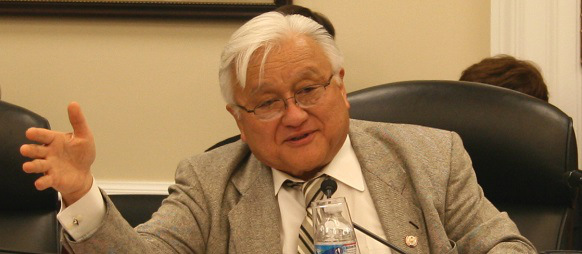Nothing short of a complete boycott will satisfy the voices Modi has silenced,” say protesters
A recent statement by Silicon Valley Congressman Mike Honda crediting the upcoming visit of Indian Prime Minister Narendra Modi as “a nod to the vibrancy of our district” is ruffling feathers more than it is calming nerves as thousands are expected to protest the controversial premier when he keynotes a Sept. 27 grand reception at the SAP Center in San Jose, CA.
“I invited and look forward Prime Minister Modi’s visit to Silicon Valley,” says Honda in a Sept. 25 statement. Qualifying his remarks with a caveat, he continues: “I am, however, well aware of the controversy that surrounds Prime Minister Modi’s visit to our region. I know this visit is a challenge for many in our community. Rest assured, I will neither overlook nor forget my duty to be a strong advocate for human rights. We must be vigilant, more than ever before, to the injustices of religious and ethnic persecution.”
Californian opponents of Modi’s visit aren’t buying it, noting that Modi was previously banned from entering the United States after being implicated in a 2002 massacre of thousands of Muslims and Christians that rocked Gujarat while he was Chief Minister of the Indian state. Explaining the ban in 2005, then U.S. Ambassador to India David Mulford stated: “Mr. Modi’s existing tourist/business visa was also revoked under section 212 (a) (2) (g) of the Immigration and Nationality Act. Section 212 (a) (2) (g) makes any foreign government official who ‘was responsible for or directly carried out, at any time, particularly severe violations of religious freedom’ ineligible for a visa to the United States.”
“Honda was missing in action last year when House Resolution 417 attempted to focus U.S.-India dialogues on human rights and religious freedom,” says Bhajan Singh, the founding director of Organization for Minorities of India (OFMI). “After exhausting entreaties by the community, he finally joined other representatives in signing two letters asking Secretary of State Kerry to speak on hunger-striker Bapu Surat Singh Khalsa, but has shown zero follow through. For years, he has failed to initiate any action on Indian human rights issues despite constant appeals by his constituents, and he maintains a wall of silence in the face of extended opposition to his inaction by a diverse set of Indian minority groups.”
While in California, Modi is scheduled to meet the CEOs of several tech companies, including Apple, Google, and Facebook. Singh, who recently protested Modi’s scheduled meeting with Google CEO Sundar Pichai outside the corporation’s Mountain View, CA headquarters, says he is disgusted by Honda’s choice to stand with a genocide-linked politician.
“In light of the atrocious internment of Japanese-Americans in the 1940s,” he comments, “we would expect Honda to be sympathetic to the sufferings of Indian minorities, but he barely managed to even issue this meaningless and double-talking statement on Modi’s visit. The only meaningful action is to shun Modi and speak out loudly against the impunity for his orchestration of genocide. Nothing short of a complete boycott will satisfy the voices Modi has silenced. I call on all Christians, Sikhs, Muslims, Dalits, and other voters residing in his district who care about human rights to remember Honda’s choice to side with the oppressor.”
Pieter Friedrich, an advisor to OFMI who spoke at a Sept. 22 San Jose City Council meeting to urge the city leadership to boycott Modi’s visit, echoes Singh’s concerns.
“Words are one thing, but actions speak much louder,” remarks Friedrich. “While we appreciate Rep. Honda’s verbal commitment to being a strong advocate for human rights, his choice to invite Modi to Silicon Valley directly contradicts that commitment. He is revealing his talent for politics by speaking out of both sides of his mouth. He describes Modi’s visit as a nod to the vibrancy of the district, but how can that be so when Modi’s political record is one of sponsoring violence to destroy diversity? If Rep. Honda truly intends to be vigilant towards religious and ethnic persecution, then exactly which questions about human rights, especially the 2002 Gujarat Genocide, will he pose to Modi during his visit? In reality, shaking Modi’s hand and posing for a photo-op places a stamp of approval on the record of a mass murderer.”
According to an independent investigation of the 2002 Gujarat violence conducted by Human Rights Watch, mobs who conducted a three-day pogrom against religious minorities used slogans claiming: “The police are with us…. Long live Narendra Modi.” Additionally, in 2007, a sting by Tehelka magazine used a hidden camera to catch Gujarati MLA Haresh Bhatt (a member of Modi’s Hindu nationalist Bharatiya Janata Party) not only admitting to his participation in the violence but stating: “[Modi] had given us three days… to do whatever we could. He said he would not give us time after that…. He did what no chief minister can do.”
Modi’s involvement in the massacre is facing fresh probes as the Gujarat High Court considers a case filed against him, as reported by the Los Angeles Times:
A Supreme Court-ordered investigation concluded in 2012 that there was not enough evidence to charge Modi or dozens of top officials with crimes. But an appeal filed by Zakia Jafri — the widow of a Muslim lawmaker killed by a mob in Ahmedabad, Gujarat’s largest city — claims the investigating team wrongfully ignored testimony implicating Modi and 59 other officials.
Jafri’s appeal, which Gujarat’s high court began hearing last month, rests largely on accounts and records produced by the whistle-blowers, whose testimony has become public through leaks, news reports and court documents.
Source: MinoritiesofIndia









